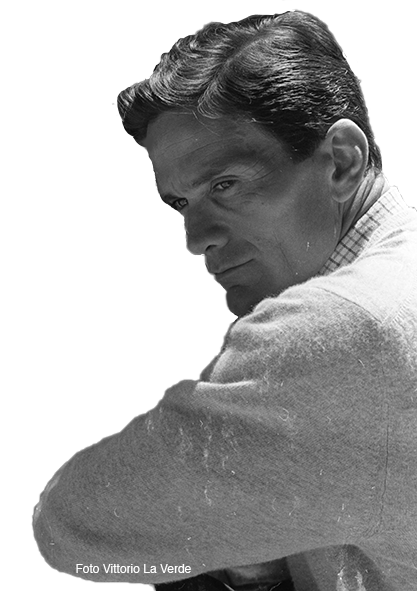[blockquote author=”P.P. Pasolini, La meglio gioventù (1954), ora in Tutte le poesie, Milano, 2003, vol. I, p. 101″ link=”” target=”_blank”] CONZÈIT Romài essi lontàns a val, Friul, essi scunussùs. A par il timp dal nustri amoùr un mar lustri e muàrt. In ta la lus la to part a è finida, no ài scur tal sen par tignì la to ombrena. [/blockquote]
[idea]Traduzione:
CONGEDO. Ormai essere lontani, Friuli, vale essere sconosciuti. Pare il tempo del nostro amore un mare lucido e morto. Nella luce la tua parte è finita, non ho buio nel petto per tenere la tua ombra.[/idea]
On September 30th 1949, in Ramuscello, a little town not far from San Giovanni, during one of the traditional summer country festivals, Pier Paolo met three boys and they spent the all night together. The following day, after an argument, the three boys accused each other about what happened the night before and told it to the police. On October 22nd, after some investigations, Pier Paolo was accused of corruption to minors and obscene acts in public. The local and national press divulgated the news that soon became a scandal. That was a period of very offensive contrasts between the Left and the DC (Christian Democracy): it was the period of the Cold War and Pasolini represented a very exposed target because of his communist intellectual and anticlerical attitude. Pier Paolo seemed apparently calm but the members of the PCI (Italian Communist Party) increased and overacted the situation, and, before verifying the veracity of the accusation, on October 26th 1949 decided to expel Pier Paolo from the party.
«La federazione del PCI di Pordenone ha deliberato in data 26 ottobre l’espulsione dal partito del Dott. Pier Paolo Pasolini di Casarsa per indegnità morale.Prendiamo spunto dai fatti che hanno determinato un grave provvedimento disciplinare a carico del poeta Pasolini per denunciare ancora una volta le deleterie influenze di certe correnti ideologiche e filosofiche dei vari Gide, Sartre e di altrettanto decantati poeti e letterati, che si vogliono atteggiare a progressisti, ma che in realtà raccolgono i più deleteri aspetti della generazione borghese».
To the accusation of the Confederation of Udine, Pasolini answered: [blockquote author=”Lettera di P.P. Pasolini a Ferdinando Mautino, da Casarsa 31 ottobre 1949 (timbro postale), in Lettere 1940-1954, Torino, 1986, p. 368″ link=”” target=”_blank”]Malgrado voi, resto e resterò comunista, nel senso più autentico di questa parola.[/blockquote]
On top of that, Pasolini was not allowed to teach in the school of Valvasone anymore. He found himself alone, without a job and picked on for his homosexuality that led to glowing arguments with his father. On January 28th1950 Pier Paolo and his mother Susanna secretly decided to leave and move to Rome: Friuli and Casarsa showed a new side: the innocence of the first times and the first discoveries then became prejudice and accusation. In that unlimited place of the universe was not possible to live in serenity and tranquillity any more.
[blockquote author=”P.P. Pasolini, Il poeta delle ceneri (1966-67), ora in Tutte le poesie, Milano, 2003, vol. II, p. 1265″ link=”” target=”_blank”]Fuggii con mia madre e una valigia e un po’ di gioie che risultarono false, su un treno lento come un merci, per la pianura friulana coperta da un leggero e duro strato di neve. Andavamo verso Roma. Avevamo dunque, abbandonato mio padre accanto a una stufetta di poveri, col suo vecchio pastrano militare e le sue orrende furie di malato di cirrosi e sindromi paranoidee. Ho vissuto quella pagina di romanzo, l’unica della mia vita: per il resto, che volete, son vissuto dentro una lirica come ogni ossesso.[/blockquote]



